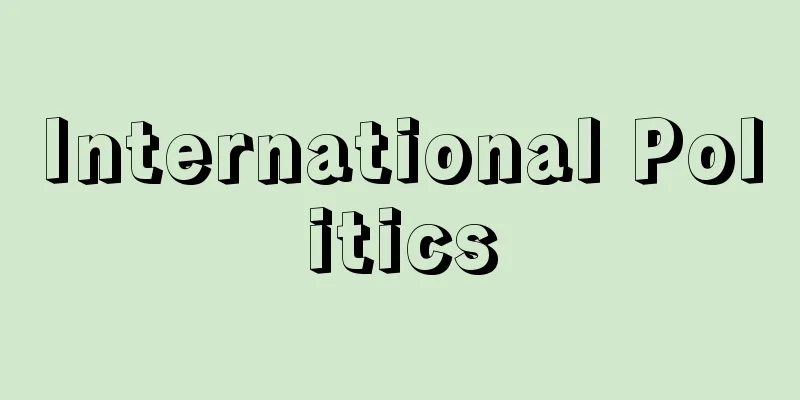International Politics

|
It was after World War I that social scientific research into international politics began in Europe and America, and that the subject was established at universities. Numerous studies on international politics have existed since Machiavelli, but they were little more than lessons for rulers or simple descriptions of diplomatic history. World War I involved all classes of people in the warring nations, and aroused deep popular interest in international issues. The demand to prevent a recurrence of war was at the foundation of international politics. Thus, international politics did not stop at describing "how things are," but sought to explore "how things should be." In the 1920s, Western international political studies had a strong tendency towards utopianism, with emphasis on the role of international law and international morality, and international organizations being the main theme. On the other hand, from a Marxist perspective, starting from Lenin's theory of imperialism, an approach to international politics was based on an analysis of the world economy, and with the outbreak of the Great Depression in the early 1930s, its analytical ability towards capitalist countries was highly praised. Meanwhile, faced with the rise of Nazism and the threat of war, Western academics reflected on the shortcomings of traditional utopianism, and a methodology that emphasized the opportunity for power in international politics was advocated. Even after World War II, the approach of understanding international politics as a struggle for power became popular. In Japan, the subjects of international law and diplomatic history have existed at universities since the Meiji era, but it was only after World War II that courses or subjects called "international politics" or "international relations" were established, and the number of scholars specializing in this field gradually increased, and academic societies were organized. Since the 1960s, quantitative methods such as behavioral science and systems analysis have become popular in the United States in connection with other fields of social science, and in Japan, as the effectiveness of Marxist methods has declined, the American academic trend has spread. The field of peace research, which is based on the idea of methods for establishing peace, which is originally a topic that should be pursued by international politics, has emerged and has become influential both internationally and in Japan. [Takashi Saito] "Postwar Japan's International Politics" edited by the Japan Association of International Relations (1979, Yuhikaku) [References] | |Source: Shogakukan Encyclopedia Nipponica About Encyclopedia Nipponica Information | Legend |
|
ヨーロッパやアメリカにおいて国際政治の社会科学的な研究が始められ、大学における教科が設置されたのは第一次世界大戦以後のことである。国際政治についての研究はマキャベッリ以来数多く存在するが、それらは支配者のための教訓か、外交史の素朴な記述にすぎなかった。第一次大戦は交戦各国の国民の諸階層を巻き込み、国際問題に対して深い大衆的関心を呼び起こした。戦争の再発を防止しようとする要求が国際政治学の基礎にあった。こうして国際政治学は「いかにあるか」の記述にとどまらず、「いかにあるべきか」を探究しようとした。 1920年代の欧米の国際政治学は、ユートピアニズムの傾向が濃く、国際法・国際道義の役割を重視し、国際機構などがおもなテーマとされた。一方、マルクス主義の立場からは、レーニンの帝国主義論に出発して世界経済の分析を基礎とする国際政治への接近が行われ、1930年代初頭の世界恐慌の発生とともに、その資本主義諸国に対する分析力について評価が高まった。一方、ナチズムの台頭と戦争の危機に直面して、欧米学界では従来のユートピアニズムの欠陥が反省され、国際政治における権力の契機を重視する方法が提唱された。第二次大戦後も、国際政治を、権力をめぐる闘争として把握する方法が流行した。 日本では、大学において国際法および外交史の科目は明治以来存在したが、国際政治学international politicsあるいは国際関係論international relationsという名の講座あるいは学科目として設けられたのは第二次大戦後のことであり、この分野を専門にする学者がしだいに増加し、学会も組織された。1960年代以後アメリカにおいては他の社会科学諸分野とも関連して、行動科学やシステム分析などの数量化的方法が盛んとなり、日本においてもマルクス主義的方法の有効性の低下とともにアメリカの学界の傾向が浸透した。本来国際政治学の追究すべき課題である平和確立の方法を理念とする平和研究peace researchという分野が現れ、国際的にもまた日本でも有力となっている。 [斉藤 孝] 『日本国際政治学会編『戦後日本の国際政治学』(1979・有斐閣)』 [参照項目] | |出典 小学館 日本大百科全書(ニッポニカ)日本大百科全書(ニッポニカ)について 情報 | 凡例 |
<<: National Bond Consolidation Fund Special Account
Recommend
Couplet - Renku
A form of Chinese poetry in which multiple authors...
syndyasmian marriage
…At the same time, Morgan believed that kinship n...
Second Opium War
After the Opium Wars, the Arrow Incident triggered...
Oryx subfamily - Oryx red
...All of them are native to Africa, and there ar...
Shimotsuma Shoushin
[Born] Tenbun 20 (1551) [Died] May 15, 1616 (Genna...
Fire Office Committee
...Insurance that covers buildings and movable pr...
antbear
…The English name is derived from the Dutch aade ...
Kappa - Bob cut
A type of hairstyle worn by young girls. It was so...
Counterweight - Counterweight
...The first modern elevator in Japan was install...
E-Language - E-Gengo
…We can expect that in the 21st century we will k...
Red vermilion Yangcheng - Tsuishuyouzei
This is the hereditary name of a family that pass...
Eshkol, L.
…The leading role in the founding of the State of...
Princess Kaashitsu
…A tale-like name in Japanese mythology that like...
Maritime traffic control
Artificially restricting the free movement of ship...
Black rockfish
…It is said that the name comes from the fact tha...









